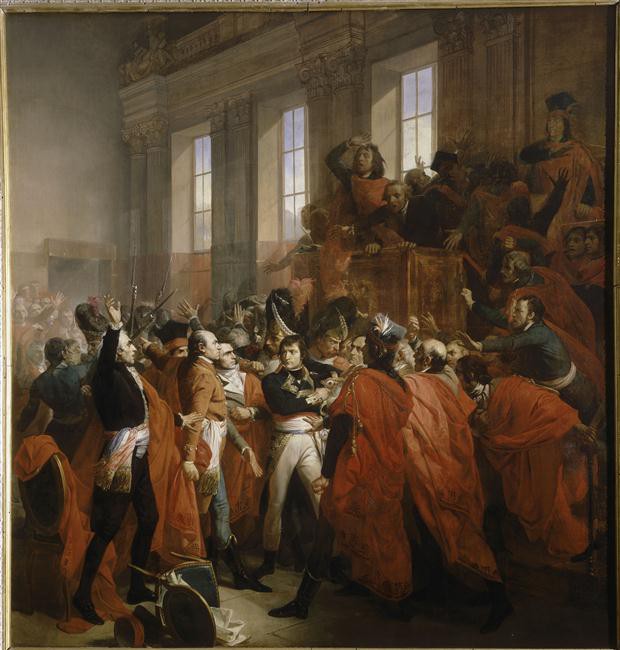-
Introduction
In 1795 the Directory succeeded the Thermidorian Convention, the regime that followed the downfall of Maximilian Robespierre and his Reign of Terror. The new regime was structured in the following way: an executive body of five directors with two legislative houses – a Council of Anciens, and a Council of Five Hundred. This separation of power sought to avoid either the danger of the tyranny of one man or the potential of a democratic government to go disastrously awry (memories of the Terror were still fresh in people’s minds). According to one député, Antoine Thibaudeau, the mission of the Directory was to find a ‘middle way of government, half-way between monarchy and demagogy’.
The Constitution of 5 Fructidor An III (22 August 1795) was the founding document of the new regime, and it broke quite considerably with the principles of the preceding regime, instead putting more emphasis on the ideals of liberty and property. Difficulties quickly began to emerge on the domestic front, caused namely by Gracchus Babeuf and his Conspiracy of Equals (an attempted coup d’État inspired by proto-socialist and Jacobin ideals), continued insurrection in the Vendée, and General Pichegru’s defection to the royalist cause, not to mention the coup d’État of 18 Fructidor An V (4 September 1797).
However, the problematic beginnings of the regime pushed one individual to the fore: Napoleon Bonaparte. He succeeded in attracting the positive attention of Barras, one of the new regime’s directors, by suppressing a royalist insurrection on 13 Vendémiaire An IV (5 October 1795) (when Bonaparte infamously gave the royalists a ‘whiff of grapeshot’), and in doing so managed to gain the confidence of the regime in only a few short months. On 12 Ventôse An IV (2 March 1796) the Directory appointed him commander of the Army of Italy.
-
Commentary
-
Documents
Bonaparte’s Proclamation to the French people on 19 Brumaire
Eyewitness account of the coup d’état of Brumaire by Helen Maria Williams
Contemporary translation of J. Fr. Michaud‘s 1800 pamphlet, ‘LES ADIEUX A BONAPARTE’
Decree promulgated on 19 Brumaire which established the provisional Consulate (photograph of an original document in French, part of the collection of the Fondation Napoléon)
Extract from ‘Life of Bonaparte, First Consul of France,’ written by a contemporary French writer, Charles-Yves Cousin d’Avallon in 1802.
-
Biographies
-
Bibliography
The coup d’État of 18 Brumaire An VIII (9 and 10 November 1799)

by François Bouchot 1840 © RMN-Grand Palais

